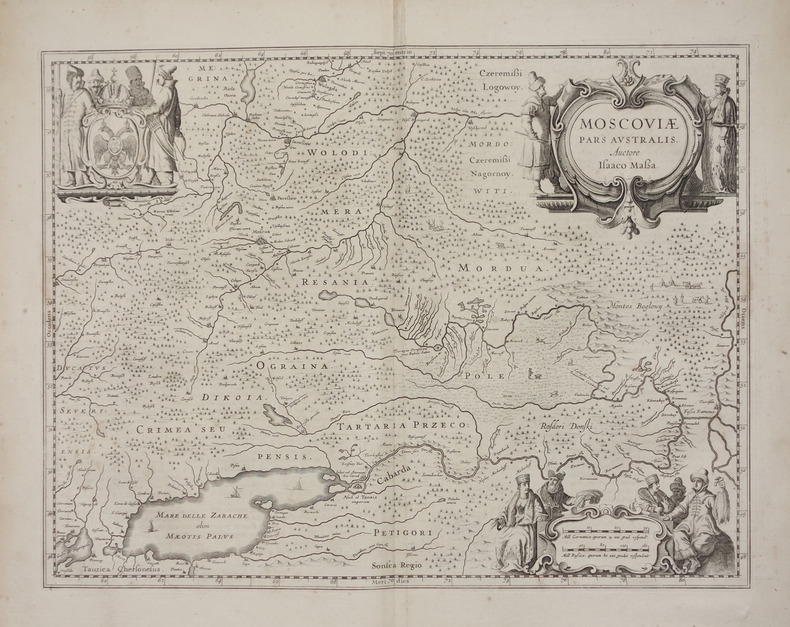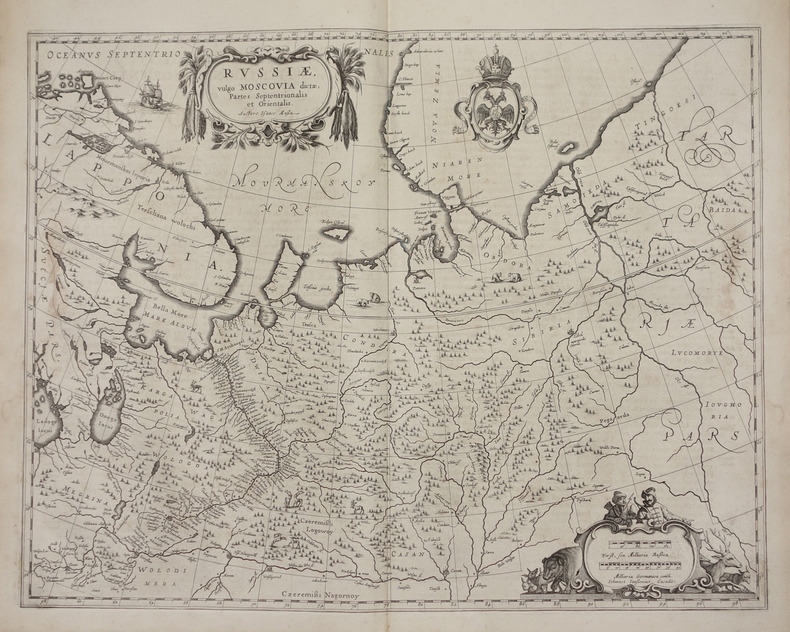-
Type
Any type (1)
Autograph (1)
Book (6495)
Engraving (27)
Magazine (359)
Maps (86)
Music sheets (48)
Old papers (2)
Photographs (58)
Postcards (1)
Posters (1)
-
Latest
Last 3 days (2)
Last month (67)
Last week (6)
-
Language
Albanian (1)
English (10)
French (7042)
German (6)
Italian (1)
Russian (17)
Spanish (2)
-
Century
16th (4)
17th (15)
18th (147)
19th (797)
20th (2571)
21st (348)
-
Countries
Belgium (460)
Brazil (1)
Canada (12)
China (5)
Côte d'Ivoire (14)
Denmark (6)
France (5902)
Greece (6)
Italy (72)
Netherlands (2)
Switzerland (599)
-
Syndicate
ALAC (12)
CLAM (3)
ILAB (2418)
NVVA (225)
SLACES (223)
SLAM (2091)
SNCAO (72)
VIOL D'UN MAUSOLÉE. LE SENS ET L'AVENIR DE LA DESTALINISATION.
Paris René Julliard 1957 in 8 (19x14,5) 1 volume relié plein maroquin marron, dos à nerfs, tête dorée (reliure signée Jacqueline Cormier), 220 pages [2]. Edition originale. Un des 30 exemplaires de luxe numérotés sur vélin corvol l'orgueilleux des papeterie Prioux (seuls grands papiers). Très bel exemplaire finement relié ( Photographies sur demande / We can send pictures of this book on simple request )
Parfait Reliure Ed. numérotée
VIOL D'UN MAUSOLÉE. LE SENS ET L'AVENIR DE LA DESTALINISATION.
Paris René Julliard 1957 in 8 (19x14) 1 volume broché, 220 pages [2], petite trace d'adhésif sur les pages de garde. Envoi autographe signé par l'auteur à un sénateur français. Bon exemplaire ( Photographies sur demande / We can send pictures of this book on simple request )
Très bon Broché Signé par l'auteur
Les Occasions perdues.... Etude stratégique et critique sur la campagne turco-russe de 1877-1878
Paris, Chapelot et Cie, 1900 gr. in-8, VIII-213 pp., croquis in-t., 6 croquis h.-t., demi-basane bleue, dos lisse orné (reliure de l'époque). Coiffe abîmée, mors supérieur fendu, coupes et coins usés.
- - VENTE PAR CORRESPONDANCE UNIQUEMENT
Les Occasions perdues.... Etude stratégique et critique sur la campagne turco-russe de 1877-1878
Paris, Chapelot et Cie, 1900 gr. in-8, VIII-213 pp., 6 croquis dépliants, demi-chagrin vert, dos lisse orné de filets (reliure de l'époque). Dos frotté, épidermures, coupes et coins usés. Cachets (annulés).
- - VENTE PAR CORRESPONDANCE UNIQUEMENT
JACOBY (Daniel), PETTITI (Louis-Edmond), RAPPAPORT (Laurent)
Reference : 37468
(1978)
L'Affaire Chtcharansky [Sharansky] procès sans défense. Préface de Laurent Scwartz.. (ENVOI AUTOGRAPHE SIGNE A VLADIMIR JANKELEVITCH).
1978 In-8, broché, couverture illustrée de l'éditeur, 248 p. Paris, Grasset, 1978.
De la bibliothèque de Vladimir Jankélévitch avec son petit cachet ex-libris ("Vl J") de la bibliothèque de Vladimir Jankélévitch et envoi d'un des co-auteur:, Daniel Jacoby: "Pour M. Jankélévitch, avec notre très sincère admiration".Autour du procès de Natan Sharansky, l'un des plus célèbres opposants soviétiques, militant des droits humains et l'un des fondateurs du mouvement "refuznik". Vladimir Jankélévitch avait participé au mouvement de mobilisation des intellectuels français en faveur de la libération de Sharansky, aux côtés des co-auteurs.Couverture légèrement défraîchie.Bon exemplaire.


Phone number : 33 01 47 07 40 60
La guerre rouge est declaree.
Softcover Editions de France, Paris, 1935. Un volume in-12 broché de 292 pages tres legeres rousseurs
Remise de 20% pour toutes commandes supérieures à 200 €
Le Tsar Nicolas II et la Révolution.
Paris, Fayard, 1931, in 12, broché, 385 pages
PHOTOS sur DEMANDE. ...................... Photos sur demande ..........................


Phone number : 04 77 32 63 69
Phone number : 33 (0)6 77 77 12 33
Napoléon en Russie. L'Empereur et le Tsar. La Famille impériale et la société russe. Les Causes de la campagne de Russie, 1807-1812. Nouveaux documents.
Les Libertés Françaises, 1938 pt in-8°, 235 pp, broché, C. de bibl., bon état
Souvarov, 1730-1800.
Payot, 1935, in-8°, 352 pp, broché, couv. illustrée d'un portrait gravé de Souvarov, bon état (Coll. Bibliothèque historique)
"L'excellente Bibliothèque historique de la maison d'édition Payot, où la Russie tient déjà une place importante, s'accroît d'une unité nouvelle qui contribuera heureusement à intéresser le grand public à une des périodes les plus curieuses de l'histoire russe en mettant en lumière la figure d'un grand soldat : Souvarov (1730-1800), par Jean Jacoby." (A. Mazon, Revue des Études Slaves, 1935)
ENTRETIENS : L'EXIL EST MA PATRIE
Un ouvrage de 230 pages, format 150 x 215 mm, broché couverture couleurs rempliée, publié en 1982, Le Centurion, collection "Les Interviews", bon état (avec un envoi de Jacqueline Bruller), peu courant
Phone number : 04 74 33 45 19
Mémoires et carnet sur la campagne de Russie.
Paris, Librairie Historique F. Teissèdre, 1998 16 x 24 cm, 155 pp., broché.
Ces deux récits proposent des points de vue bien différents sur la campagne de Russie : d'un côté celui d'un théoricien (Bismarck était un officier supérieur wurtembergeois au service de Napoléon) et de l'autre, celui d'un homme de terrain (Jacquemont était capitaine dans l'artillerie). - - VENTE PAR CORRESPONDANCE UNIQUEMENT
Jacques Chiquet Le Nouveau et Curieux Atlas Geographique et Historique.
Reference : 22875
(1719)
ESTATS DU GRAND DUC DE MOSCOVIE ou de L'EMPEREUR de la RUSSIE BLANCHE.suivant les dernieres relations White Russia.Carte gravée d'époque coloris époque avec feuillet de texte imprimé joint ,extrait du Nouveau et Curieux Atlas Geographique et Historique.
1719 Paris,Nouveau et Curieux Atlas Geographique et historique., c.1719.Published by La Nouveau et Curieux Atlas Geographique et historique. c.1719., 1719 Copper engraving. Original colour with later additions. Size: 22 x 16.5 cm. (8? x 6? inches). Fine condition, good margins. Map of European Russia, with a list of Dukes of Muscovy at lower left and a title cartouche at top right. In the early eighteenth century, French cartography overtook the Dutch in terms of accuracy and design. Chiquet's delightful Nouveau et Curieux Atlas was typical product of the time. Moreland and Bannister, p.132.
Cartographe :Jacques ChiquetNé en 1673 à Paris et Mort dans cette même Ville en 1721, Est un Graveur Editeur et Marchand d'Estampes Français, il Publiera en 1719 Le Nouveau et Curieux Atlas Géographique et Historique, Destiné à un Public Riche Dont Cette Carte est Tirée. Remise de 20% pour toutes commandes supérieures à 200 €
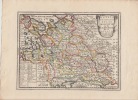
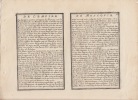
"U.R.S.S. Terre d'oppression - En lisant André Gide"
"1937. Paris Éditions SPES 1937 - Broché 11 5 cm x 18 cm 30 pages - Texte de Jacques Delille - Très bon état"
Un regard derrière le rideau de fer
FRANCFORT-sur-le-MEIN, Union Druckerei Verlag, 1951- In-8 - Broché - Couverture illustrée - Bien complet de la planche dépliante in-fine explicitant "la bolchévisation de l'Allemagne par l'appareil du Kremlin" - 62 pages - Propre
- Livraison a domicile (La Poste) ou sur simple demande en Mondial Relay.- ATTENTION: Colis recommandé uniquement sur demande (parcel recommended on request). Si vous désirez un remboursement équivalent au montant de votre achat, en cas de perte détérioration ou spoliation, demandez-nous expressément un envoi en recommandé ( if you wish a repayment equivalent to the amount of your purchase, in case of loss - deterioration or despoliation, ask us expressly for a sending recommended)- Conditions de vente : Les frais de port sont affichés à titre Indicatifs (pour un livre) Nous pouvons être amené à vous contacter pour vous signaler le surcoût du au nopmbre de livres achetés ou du poids de ceux-ci. - Conditions of sale : The shipping costs are displayed as an indication (for one book) We may need to contact you to inform you of the cost of the additional shipping depending on the weight and the number of books- Possibilité d'envoi par Mondial-Relay - Réception en boutique sur rendez-vous. Librairie G. PORCHEROT - SP.Rance - 0681233148
La Russie blanche ou Moscovie divisée suivant l'estendüe des royaumes, duchés, principautés, provinces et peuples qui sont présentement sous la domination du Czar de Russie, connû sous le nom de grand duc de Moscovie.
Paris, H. Jaillot, 1717. 450 x 645 mm.
Carte de la Russie ornée d'un cartouche de titre décoré des armoiries royales, de deux personnages russes et deux anges. Bel exemplaire aux contours coloriés à l'époque.

Poems of Sophia
Semantron Press 2014 200 pages 15 24x22 86x1 1684cm. 2014. Broché. 200 pages.
Comme neuf
Un crescendo à travers les ages. Essai sur l’architecture religieuse en bois de la Russie septentrionale.
Paris, Georges Girard, 1985, in-4, (7) ff., 340 pp., nombreuses illustrations, broché.
Das Zusammenwirken von Heer und Flotte im russisch-japanischen Kriege 1904/05. Mit einer überstskarte.
Berlin, R. Eisenschmidt 1905, 245x165mm, 57Seiten, broschiert.
Pour un paiement via PayPal, veuillez nous en faire la demande et nous vous enverrons une facture PayPal
La Russie et la Pologne il y a un siècle
Bruxelles, Victor Devaux 1865 46pp., br.orig., 19cm., bon état
Perestroik'Art Polyloog - Kunstproject hedendaagse Russische schilderkunst 1985-1990. Perstroik'Art Polylogue - Projet d'art peinture russe contemporain 1985-1990
, Hasselt, Cultureel Centrum 1995, 144pp.geïll., mooie staat, bilingue [français-néerlandais], Tentoonstellingscatalogus - Catalogue d'exposition (Hasselt/ Maastricht, 1995]
[ESTONIE/LETTONIE] Nova totius Livoniae accurata descriptio.
[Amsterdam, 1658]. 389 x 514 mm.
Belle carte figurant l'Estonie et la Lettonie, issue du Théâtre du Monde de Joannes Jansson. Texte français au verso. Bon exemplaire. Koeman's Atlantes Neerlandici, 1710:1B.1.
![[ESTONIE/LETTONIE] Nova totius Livoniae accurata descriptio.. JANSSON (Joannes).](https://static.livre-rare-book.com/pictures/LBW/lbw-2759_1_thumb.jpg)
Moscoviae pars australis.
[Amsterdam, 1658]. 382 x 501 mm.
Belle carte figurant le sud-ouest de la Russie jusqu'à la mer Noire, dressée par Isaac Massa, diplomate néerlandais en Russie, et issue du Théâtre du Monde de Joannes Jansson. Elle s'étend au nord jusqu'à Vologda, à l'ouest jusqu'à Smolensk et à l'est jusqu'à la Volga. Elle est ornée d'un cartouche de titre décoré de deux personnages, des armoiries de la Russie entourées de quatre personnages, et d'un cartouche contenant l'échelle avec cinq personnages dont deux féminins. Texte français au verso. Déchirure dans la partie haute de la carte restaurée. Koeman's Atlantes Neerlandici, 1802:1.2.
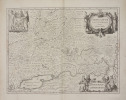
Russiae, vulgo Moscovia dictae, partes septentrionalis et orientalis.
[Amsterdam, 1658]. 438 x 540 mm.
Belle carte figurant le nord-ouest de la Russie avec la Laponie, dressée par Isaac Massa, diplomate néerlandais en Russie, et issue du Théâtre du Monde de Joannes Jansson. Elle est ornée d'un cartouche de titre, des armoiries de la Russie et d'un cartouche contenant l'échelle. Texte français au verso. Rousseurs légères aux extrémités gauche et droite de la carte. Koeman's Atlantes Neerlandici, 1801:1.1.
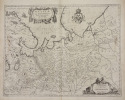
Tableau de la Russie jusqu'à la mort de Staline.
1954 Couverture souple Paris, Librairie Plon, 1954. In-8, broché (14 x 22cm), couverture imprimée en deux couleurs, quelques marques sur les plats et au dos. 448 pages, papier roux. L'auteur analyse l'héritage de Staline, dans les domaines économiques et politiques. Des chapitres spéciaux sont consacrés à l'Ukraine, à la Sibérie, aux relations avec la Chine. Bon état intérieur.
Bon
 Write to the booksellers
Write to the booksellers![L'Affaire Chtcharansky [Sharansky] procès sans défense. Préface de Laurent Scwartz.. (ENVOI AUTOGRAPHE SIGNE A VLADIMIR JANKELEVITCH).. JACOBY ...](https://static.livre-rare-book.com/pictures/HAT/37468_1_thumb.jpg)


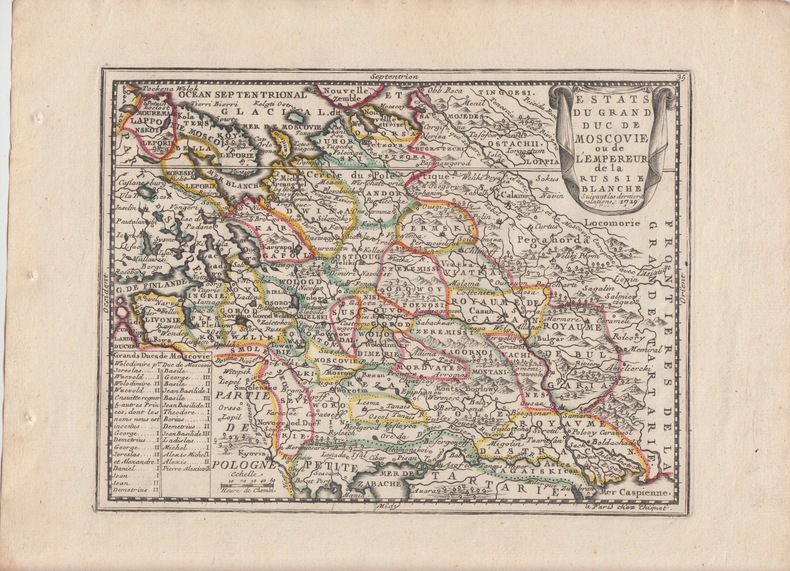

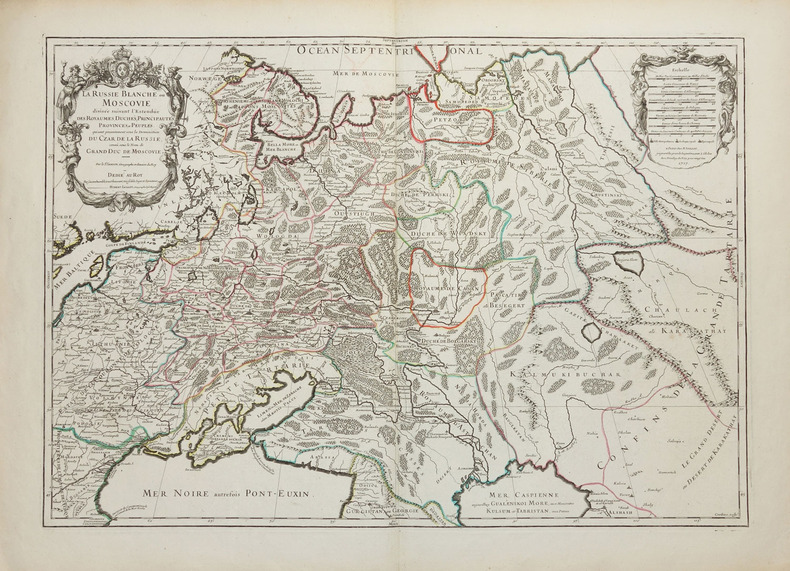




![[ESTONIE/LETTONIE] Nova totius Livoniae accurata descriptio.. JANSSON (Joannes).](https://static.livre-rare-book.com/pictures/LBW/lbw-2759_1.jpg)
